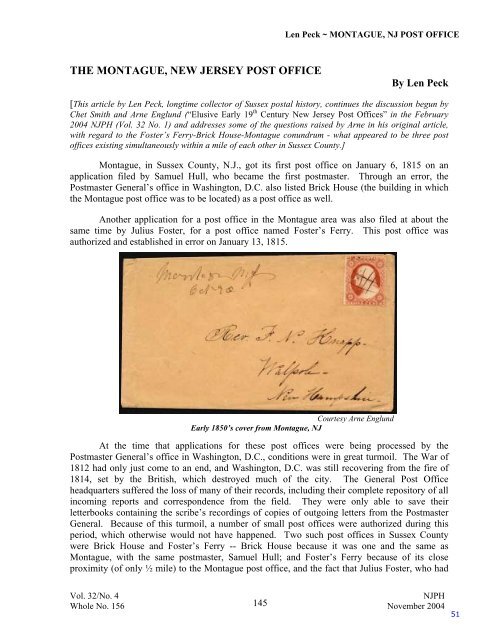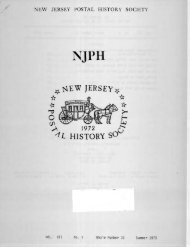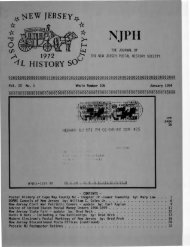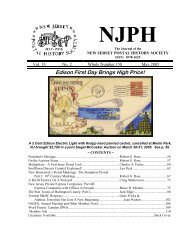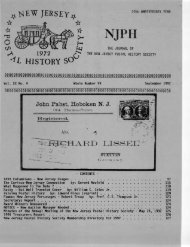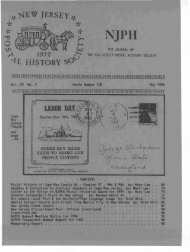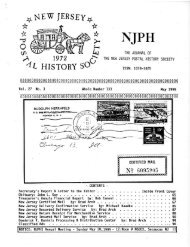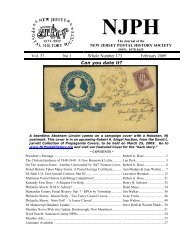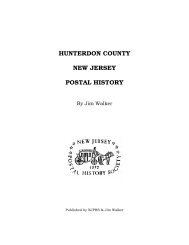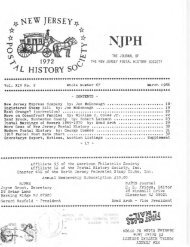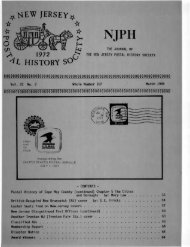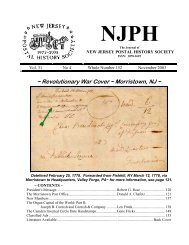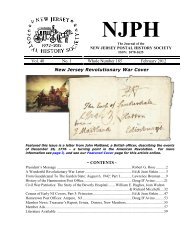Essays on Sussex County and New Jersey Postal History
Essays on Sussex County and New Jersey Postal History
Essays on Sussex County and New Jersey Postal History
You also want an ePaper? Increase the reach of your titles
YUMPU automatically turns print PDFs into web optimized ePapers that Google loves.
Len Peck ~ MONTAGUE, NJ POST OFFICETHE MONTAGUE, NEW JERSEY POST OFFICEBy Len Peck[This article by Len Peck, l<strong>on</strong>gtime collector of <strong>Sussex</strong> postal history, c<strong>on</strong>tinues the discussi<strong>on</strong> begun byChet Smith <strong>and</strong> Arne Englund (“Elusive Early 19 th Century <strong>New</strong> <strong>Jersey</strong> Post Offices” in the February2004 NJPH (Vol. 32 No. 1) <strong>and</strong> addresses some of the questi<strong>on</strong>s raised by Arne in his original article,with regard to the Foster’s Ferry-Brick House-M<strong>on</strong>tague c<strong>on</strong>undrum - what appeared to be three postoffices existing simultaneously within a mile of each other in <strong>Sussex</strong> <strong>County</strong>.]M<strong>on</strong>tague, in <strong>Sussex</strong> <strong>County</strong>, N.J., got its first post office <strong>on</strong> January 6, 1815 <strong>on</strong> anapplicati<strong>on</strong> filed by Samuel Hull, who became the first postmaster. Through an error, thePostmaster General’s office in Washingt<strong>on</strong>, D.C. also listed Brick House (the building in whichthe M<strong>on</strong>tague post office was to be located) as a post office as well.Another applicati<strong>on</strong> for a post office in the M<strong>on</strong>tague area was also filed at about thesame time by Julius Foster, for a post office named Foster’s Ferry. This post office wasauthorized <strong>and</strong> established in error <strong>on</strong> January 13, 1815.Courtesy Arne EnglundEarly 1850’s cover from M<strong>on</strong>tague, NJAt the time that applicati<strong>on</strong>s for these post offices were being processed by thePostmaster General’s office in Washingt<strong>on</strong>, D.C., c<strong>on</strong>diti<strong>on</strong>s were in great turmoil. The War of1812 had <strong>on</strong>ly just come to an end, <strong>and</strong> Washingt<strong>on</strong>, D.C. was still recovering from the fire of1814, set by the British, which destroyed much of the city. The General Post Officeheadquarters suffered the loss of many of their records, including their complete repository of allincoming reports <strong>and</strong> corresp<strong>on</strong>dence from the field. They were <strong>on</strong>ly able to save theirletterbooks c<strong>on</strong>taining the scribe’s recordings of copies of outgoing letters from the PostmasterGeneral. Because of this turmoil, a number of small post offices were authorized during thisperiod, which otherwise would not have happened. Two such post offices in <strong>Sussex</strong> <strong>County</strong>were Brick House <strong>and</strong> Foster’s Ferry -- Brick House because it was <strong>on</strong>e <strong>and</strong> the same asM<strong>on</strong>tague, with the same postmaster, Samuel Hull; <strong>and</strong> Foster’s Ferry because of its closeproximity (of <strong>on</strong>ly ½ mile) to the M<strong>on</strong>tague post office, <strong>and</strong> the fact that Julius Foster, who hadVol. 32/No. 4NJPHWhole No. 156 145November 200451


